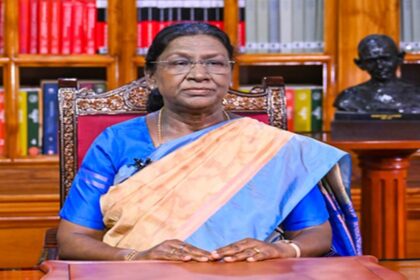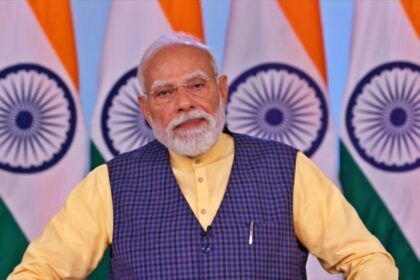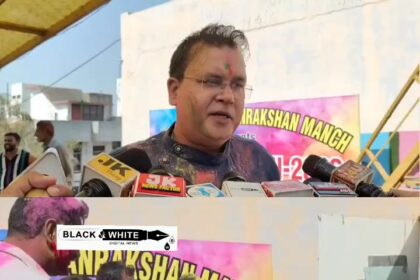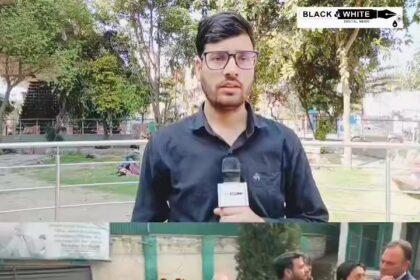Irani Asks:Does Congress Support Renaming Shankaracharya Hill to Takht-e-Sulaiman?” Regional Leaders’ Silence Speaks Volumes.
||Black and White Digital News ||
||August ||24 ,2024 ||
Former Union Minister Smriti Irani’s recent remarks about the Congress-National Conference (NC) alliance have sparked a political firestorm in Jammu & Kashmir, with Irani accusing the alliance of endorsing an agenda that threatens the unity and cultural integrity of India. Despite the gravity of her allegations, key regional leaders—Omar Abdullah, Mehbooba Mufti, Sajad Lone, and Altaf Bukhari—have remained silent, raising questions about their stance on the issues Irani highlighted.
Irani’s Allegations: A Direct Challenge to Regional Politics:
Smriti Irani, during her press conference on August 23, 2024, made several provocative statements, questioning the Congress party’s support for the National Conference’s (NC) agenda. She particularly focused on the NC’s push to reinstate Article 370, which granted special status to Jammu & Kashmir, and Article 35A, which defined the state’s permanent residents. Irani accused the NC of promoting policies that could weaken India’s unity by advocating for a separate flag and greater autonomy for the region.
One of the most contentious points Irani raised was the alleged intention of the NC to rename Srinagar’s historic sites—Shankaracharya Hill to Takht-e-Sulaiman and Hari Parbat to Kooh-e-Maran. She questioned whether Congress supports these potential changes, which she claimed could erase the cultural and historical identity of the region. This specific allegation touched on deep-seated cultural sensitivities and was seen as an attempt to rally support around the preservation of Jammu & Kashmir’s heritage.
Regional Leaders’ Silence: A Strategic Decision or Indifference?
The silence of key regional leaders in response to Irani’s statements has been notable and widely discussed. Here’s a closer look at what their silence could indicate:
Omar Abdullah – National Conference (NC) Vice President:
As the leader of the party directly implicated by Irani’s allegations, Omar Abdullah’s silence is particularly striking. The NC has traditionally been a strong advocate for the special status of Jammu & Kashmir, with Omar Abdullah himself frequently calling for the restoration of Article 370 and 35A. However, his lack of response to Irani’s claims about renaming historical sites and endorsing divisive policies may be a calculated move. By not engaging directly with Irani’s accusations, Omar might be attempting to avoid giving further credibility to what he might consider provocative rhetoric intended to polarize the electorate ahead of the elections. Alternatively, his silence could be interpreted as a reluctance to address potentially divisive cultural issues that might alienate certain voter bases.
Mehbooba Mufti – PDP Chief:
Mehbooba Mufti, leader of the People’s Democratic Party (PDP), is another significant regional figure who has not commented on Irani’s statements. Known for her strong stance on preserving the special status of Jammu & Kashmir, Mehbooba has often criticized the abrogation of Article 370 and has positioned herself as a defender of Kashmiri identity. Her silence on the specific allegations about renaming historic sites could be strategic, aimed at avoiding unnecessary controversy or escalation during a sensitive election period. However, it could also suggest a cautious approach, where she might be weighing the political ramifications of responding to Irani’s accusations.
Sajad Lone – People’s Conference Leader:
Sajad Lone, a key political figure in the region and leader of the People’s Conference, has also refrained from addressing Irani’s remarks. Known for his pragmatic approach to politics in Jammu & Kashmir, Lone has often walked a fine line between advocating for Kashmiri rights and engaging with the broader Indian political landscape. His silence might indicate a desire to avoid getting entangled in a debate that could detract from his own political agenda or complicate his party’s position in the evolving political dynamics of the region. It might also reflect a reluctance to engage in a discourse that could be seen as divisive or inflammatory.
Altaf Bukhari – Apni Party President:
Altaf Bukhari, the president of the Apni Party, which has positioned itself as a centrist and development-focused party, has also not responded to Irani’s statements. Bukhari’s party has generally avoided taking strong stances on cultural and historical issues, focusing instead on economic development and practical governance in Jammu & Kashmir. His silence could be consistent with his party’s strategy of avoiding polarizing issues, especially those that might distract from their core message of stability and development. However, it could also be seen as an attempt to maintain neutrality in a highly charged political environment.
The Political Implications of Their Silence:
The silence of these key regional leaders in the face of Smriti Irani’s allegations can be interpreted in several ways. On one hand, it might suggest a strategic decision to avoid engaging with what they might perceive as an attempt to distract from more pressing issues, such as governance, development, and security in Jammu & Kashmir. On the other hand, their silence might be seen by some as a tacit acknowledgment of the sensitivity of the issues raised, particularly those related to cultural identity and historical legacy.
Irani’s remarks have undoubtedly added a new layer of complexity to the political landscape in Jammu & Kashmir. As the region approaches its Assembly elections, the questions she raised—particularly those about cultural heritage, national unity, and political alliances—are likely to remain in the spotlight. Whether the silence of these regional leaders will continue or whether they will eventually address the allegations directly remains to be seen. In the meantime, Irani’s statements have succeeded in drawing attention to the broader debates surrounding the future of Jammu & Kashmir within the Indian Union.
Sajad Gani Lone
Leave a comment
You Might Also Like
President Droupadi Murmu Greets People On Holi Eve
President Droupadi Murmu Greets People On Holi Eve President Droupadi Murmu, on Tuesday, greeted fellow citizens on the eve of…
3 Min Read
Carney’s Visit Has Built Strong Foundation For Renewed Partnership: PM Modi
Carney’s Visit Has Built Strong Foundation For Renewed Partnership: PM Modi Prime Minister Narendra Modi on Tuesday said the visit…
1 Min Read
Jayesh Kumar Sends Warm Holi Wishes to the Public
Jayesh Kumar Sends Warm Holi Wishes to the Public #Holi2026 #HappyHoli #HoliWishes #JayeshGupta #HoliGreetings #FestivalOfColors #HoliCelebration #HoliFestival #IndiaFestivals #SpreadLove #HoliJoy…
0 Min Read
Speak for Iran, Get an FIR? Mehbooba Mufti Questions Democracy
Speak for Iran, Get an FIR? Mehbooba Mufti Questions Democracy
0 Min Read









